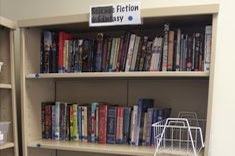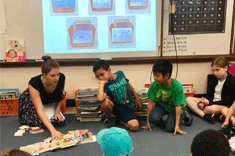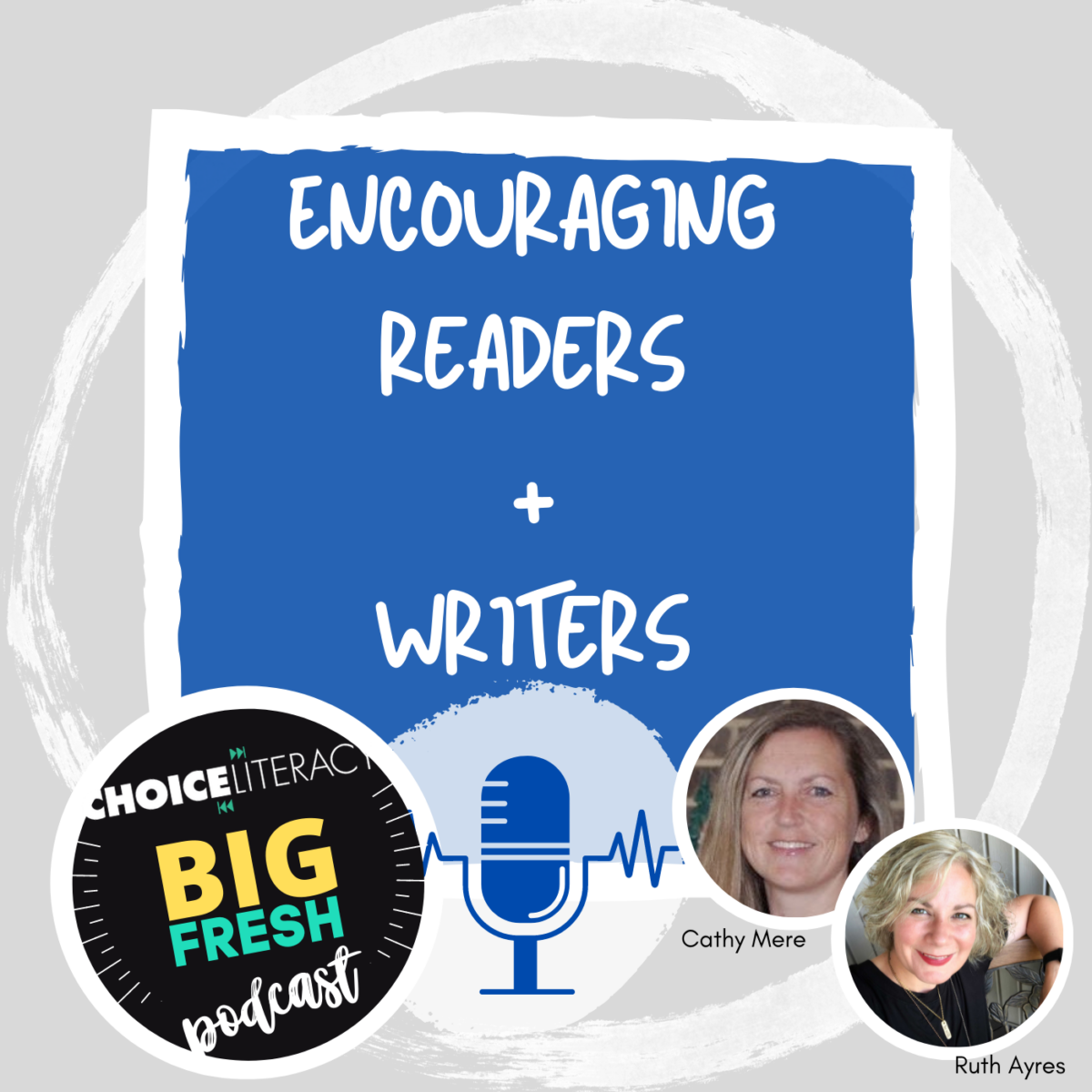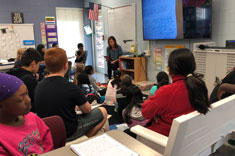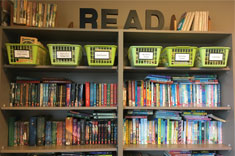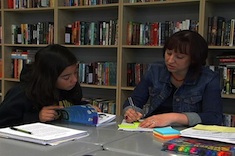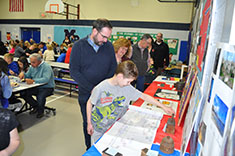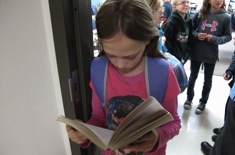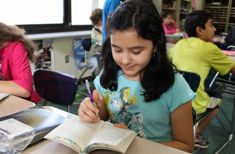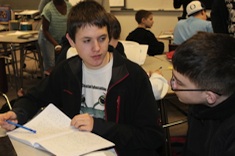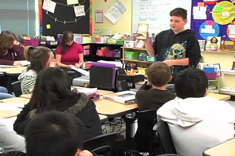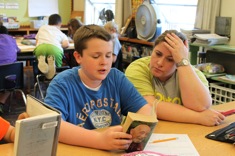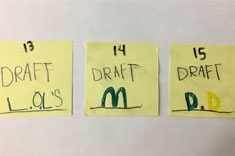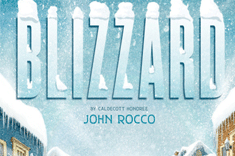Articles
Here is where you’ll find all the latest print features from our contributors. If you’d like to browse specifically by grade level, topic, or contributor, you can use the links in the right sidebar.
Latest Content
Leading Students Toward Underused Sections of the Classroom Library
Gretchen Schroeder intentionally leads students to “jilted genres” in her classroom library.
The Seasons of Classroom Libraries
Melissa Quimby shifts her classroom library throughout the year so that as her students grow as readers, her library will continue to nourish them.
Encouragement for Readers and Writers Podcast
Cathy mere and Ruth Ayres discuss building connections beyond the classroom.
Formative Assessment From Share Sessions
Ruth Ayres outlines different kinds of share sessions and different formats for the share, including some that take advantage of technology.
Write Like Nancy
Inspired by a stranger on a walk, Jen Court clarifies the importance of sharing our writing lives with others. She identifies three important qualities of a writing community.
The Answer Is Always “Yes”
Julie Johnson shows how saying yes empowers students to do the work of writers: make decisions, experiment, build relationships, and be confident as a writer.
Hanging Out, Messing Around, Geeking Out (or, how to give students the resources, space, and time for self-directed literacy learning)
Matt Renwick challenges educators that if we believe that social and emotional learning is just as important as academics, then we ought to use resources, space, and time to support self-directed learning.
The Choice Literacy Book Club Discusses Enduring Freedom
The Choice Literacy Book Club discusses Enduring Freedom by Jawad Arash and Trent Reedy.
Expanding Book Choices for Secondary Readers
Ruth Ayres challenges us to be more open to the books that live in our secondary classroom libraries. She contends that committing to supporting choice in independent reading means rethinking some of the restrictions we put on adolescent readers.
A Case for Graphic Novels as “Real” Reading
Christy Rush-Levine makes a case for the robust nature of reading graphic novels. Included are two downloads: a classroom library permission slip and an initial reader’s notebook entry form.
Building Connections Beyond the Classroom Walls Podcast
Cathy mere and Ruth Ayres discuss building connections beyond the classroom.
Creating a Community of Care: Beyond the Classroom Walls
Stella Villalba outlines three ways to cultivate a community for students beyond the classroom walls. There is comfort for teachers and students in knowing that a larger community is rooting for them.
The Classroom Library: Building Bridges
Cathy Mere presses to help children take the first steps in growing a sustainable reading life that carries beyond the classroom walls. She offers ways to build bridges to the school and public libraries as an essential step.
Fueling Creativity Podcast
Heather Fisher and Ruth Ayres discuss fueling creativity.
Secondary Readers Podcast
Leigh Anne Eck and Ruth Ayres discuss secondary readers.
Assessing Readers Podcast
Cathy Mere and Ruth Ayres discuss assessing readers.
How to Use Students’ Reading Logs as a Formative Literacy Assessment
Matt Renwick reminds us that there is a lot of information available in our classrooms that can inform instruction. Some of it is “hiding in plain sight,” for example reading logs.
Reading Quiz
Gretchen Schroeder shares the way she adjusts her reading quizzes to assess students’ analysis and deep thinking about texts.
The Choice Literacy Book Club Discusses So You Want to Be an Owl
The Choice Literacy Book Club discusses So You Want to Be an Owl by Jane Porter and Maddie Frost.
Books to Fuel Creativity and Imagination
Stella Villalba shares books that will fuel your creativity and nourish your imagination.
Five Phrases That Should Be at the Top of Every Writer’s First Draft
Matt Renwick gives five phrases every writer should put at the top of a draft, and then explores the way doing so can help develop creativity.
See Your Students
Shari Frost shares ways teachers can show that they “see” and appreciate each student every single day.
Learning to Notice and Analyze Complexities
Gretchen Schroeder supports her high school students to think deeply about the complexities around them, beginning with themselves and pop culture, and then moving to the texts they are reading.
Finding Time for Read Aloud
Katherine Sokolowski makes a case for the importance of reading aloud to secondary students and offers suggestions to make it a reality. She includes a list of five surefire read aloud books for middle school students.
Helping Young Writers Make Plans
Tammy Mulligan promotes independence in her student writers by supporting them in creating writing plans. A download of a planning template is included so your students can create writing plans, too.
Ten Ways to Celebrate Writers
Jen Court gives 10 ways for students to share and celebrate their work as writers. Two downloads are included for you to use in your classroom.
Using Picture Books Podcast
Cathy Mere and Ruth Ayres discuss using picture books in literacy instruction.
Picture Books to Teach Conflict
Katherine Sokolowski shares a book list that inspires her to teach five different kinds of conflict.
Picture Books that Help Construct a Wider Definition of Home
Stella Villalba compiles a book list about the topic of home. She shares the way she allows students to co-construct their own understanding of home by using picture books that provide a variety of lenses through which to view the topic.
Making Workshop Work Podcast
Cathy Mere and Ruth Ayres discuss making workshop work.
Browse Content By
Type
Category
- Assessment Tools
- Big Fresh Archives
- Booklists
- Choice Numeracy
- Classroom Design
- Common Core
- Community Building
- Conferring
- Content Literacy
- Digital Literacy
- English Language Learners
- Equity
- Family Relations
- Free Samples
- Guiding Groups
- Leadership
- Literacy Coaches
- Mentor Texts
- Minilessons
- New Teacher Mentors
- Podcasts
- Poetry
- Quote Collections
- Reading Strategies
- Self Care
- Struggling and Striving Learners
- Talking and Listening
- Teacher Study Groups
- Teaching Reading
- Teaching Writing
- Word Study and Vocabulary
Author
- Melissa Quimby
- Nawal Qarooni
- Gwen Blumberg
- Julie Cox
- The Lead Learners
- Hannah Tills
- Josie Stewart
- Ruth Metcalfe
- Mallory Messenger
- Becca Burk
- Jodie Bailey
- Vivian Chen
- Mary Brower
- Tiffany Abbott Fuller
- Stephanie Affinito
- Ruth Ayres
- Leigh Anne Eck
- Heather Fisher
- Shari Frost
- Julie Johnson
- Suzy Kaback
- Gigi McAllister
- Shirl McPhillips
- Melanie Meehan
- Cathy Mere
- Debbie Miller
- Tara Barnett and Kate Mills
- Tammy Mulligan
- Dana Murphy
- Bitsy Parks
- David Pittman
- Brenda Power
- Heather Rader
- Matt Renwick
- Mandy Robek
- Christy Rush-Levine
- Gretchen Schroeder
- Jen Schwanke
- Brian Sepe
- Katherine Sokolowski
- Stella Villalba
- Jennifer Vincent
Grade Level
Choice Literacy Membership
Articles
Get full access to all Choice Literacy article content
Videos
Get full access to all Choice Literacy video content
Courses
Access Choice Literacy course curriculum and training

